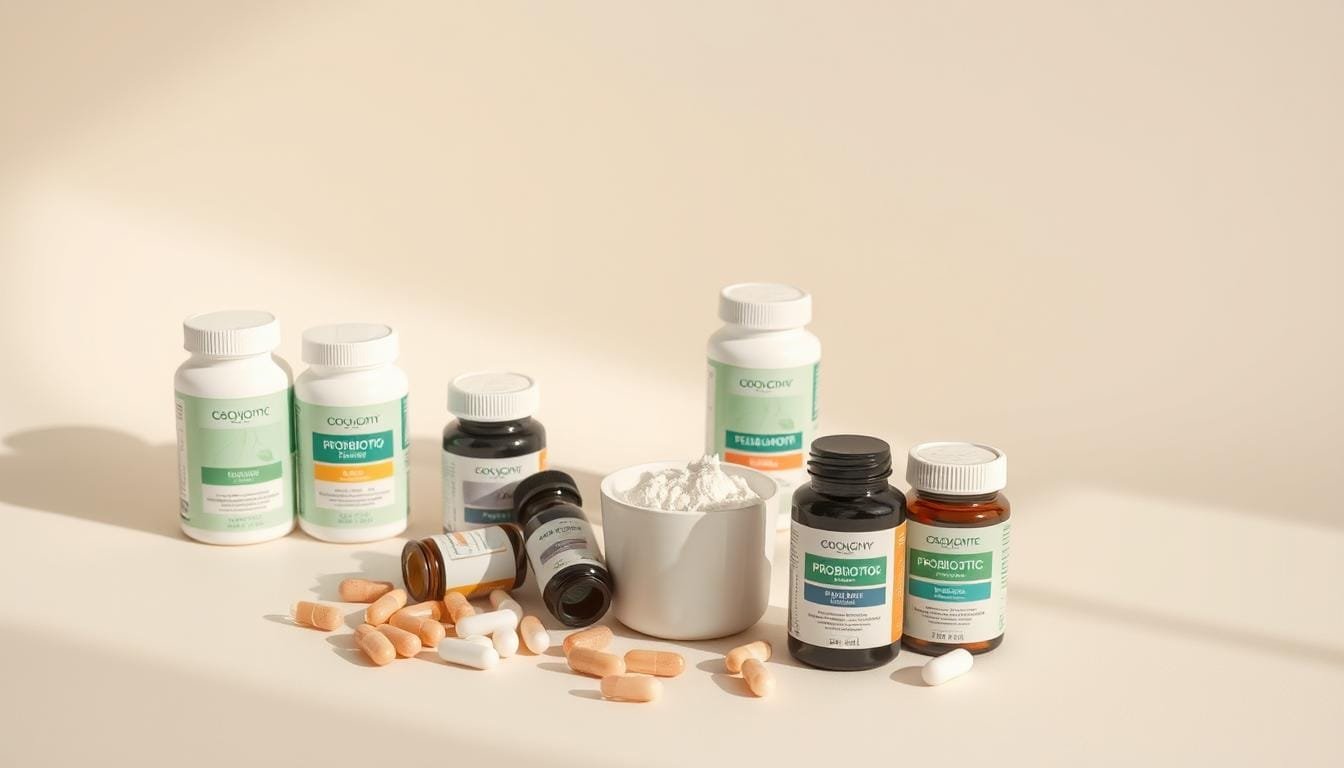Currently Empty: RM0.00
Managing digestive wellness can feel overwhelming for those with delicate systems. Many supplements designed to support gut health may cause bloating or discomfort, leaving individuals frustrated. Wellness Concept Malaysia focuses on solutions that prioritize both effectiveness and gentleness.
The team at Wellness Concept Malaysia has carefully evaluated formulations to address unique needs. Their approach combines scientific research with real-world testing, ensuring products work harmoniously with sensitive digestive tracts. This guide shares insights into selecting strains that promote balance without irritation.
Readers will discover practical tips for integrating these supplements into daily life. The article highlights safety factors and how to recognize high-quality options. With the right knowledge, achieving digestive comfort becomes an attainable goal.
Key Takeaways
- Tailored probiotic solutions exist for delicate digestive systems
- Specific bacterial strains offer gentler support
- Product quality and formulation impact effectiveness
- Gradual integration helps minimize initial discomfort
- Professional guidance enhances results
Introduction to Probiotics and Sensitive Stomachs
Maintaining gut harmony presents unique challenges for some. Trillions of microorganisms naturally reside in the digestive tract, working together to process nutrients and protect overall wellness. When this microbial community faces imbalances, discomfort often follows.
What Are Probiotics?
Probiotics are live microorganisms that support existing gut communities. These tiny helpers come from fermented foods or supplements, adding beneficial strains to your system. They assist with breaking down food, producing vitamins, and crowding out harmful bacteria.
Research shows these microbes influence more than digestion. They interact with immune cells and even send signals to the brain through the gut-brain axis. This makes them valuable allies for holistic health.
Why Sensitive Stomachs Need Special Care
Delicate digestive systems often react strongly to changes. An imbalanced microbiome might trigger bloating or irregularity when introducing new elements. Starting with low doses of targeted strains allows gradual adaptation.
Studies suggest that Lactobacillus and Bifidobacterium species tend to be gentler options. Pairing them with prebiotic fibers can enhance their effectiveness while reducing initial discomfort. Always consult healthcare providers when addressing persistent digestive concerns.
Understanding Gut Health and the Microbiome
Your digestive system houses a hidden ecosystem that impacts nearly every aspect of wellness. This microbial world contains over 1,000 species working like a biological orchestra. Their harmony affects nutrient processing, immune responses, and even emotional states.

A balanced microbiome acts as both shield and engine. Beneficial bacteria strengthen intestinal walls while breaking down food efficiently. When dominant, they crowd out harmful microbes that might trigger discomfort.
Several factors can disrupt this delicate equilibrium:
| Balanced Microbiome | Imbalanced Microbiome |
|---|---|
| Diverse bacterial strains | Reduced microbial variety |
| Efficient nutrient absorption | Bloating or irregularity |
| Strong gut barrier function | Increased inflammation risk |
Stress, processed foods, and antibiotics often tip the scales toward imbalance. For those with reactive digestive systems, even small shifts can cause noticeable effects. Personalized approaches work best – what stabilizes one person’s gut might not suit another.
Emerging research highlights how climate and diet in Malaysia influence microbial needs. Testing kits now help identify which strains your system lacks. This knowledge guides smarter choices for lasting health support.
Best Probiotics for Sensitive Stomachs
Navigating dietary supplements requires extra attention when dealing with delicate digestive needs. Specialized formulas address these challenges through targeted bacterial combinations and delivery methods.
Key Benefits for Digestive Health
Gentle microbial blends enhance food breakdown by stimulating enzyme activity. This process improves nutrient uptake from meals while reducing post-meal heaviness. Users often report more predictable bathroom patterns within weeks.
Advanced formulations use acid-resistant capsules to protect live cultures. This technology ensures viable microorganisms reach intestinal environments intact. Pairing with prebiotic fibers creates ideal growth conditions for beneficial strains.
How They Support Sensitive Systems
These solutions strengthen intestinal walls through protein synthesis and inflammation control. Research shows certain strains modulate immune responses, decreasing reactivity to common food triggers.
A 2023 clinical trial demonstrated:
“Participants using tailored formulas experienced 40% less abdominal discomfort compared to standard options.”
Gradual microbial colonization helps recalibrate gut-brain communication pathways. This adjustment period allows the body to adapt without overwhelming delicate systems. Monitoring portion sizes and hydration enhances these effects.
Exploring Common Probiotic Strains
The human gut thrives on specialized bacterial allies that adapt to unique digestive environments. Selecting the right microbial partners can make all the difference for delicate systems. Two genera dominate clinical research for their gentle yet effective support.
Lactobacillus Acidophilus and Its Benefits
Lactobacillus acidophilus naturally inhabits multiple areas, from the intestinal tract to the mouth. This strain excels at balancing pH levels, creating unfavorable conditions for harmful microbes. Studies show it produces bacteriocins – natural compounds that inhibit pathogens.
Its versatility extends to lactose digestion support, easing mild intolerances. A 2022 review noted:
“Regular supplementation reduced digestive discomfort by 38% in lactose-sensitive adults.”
Bifidobacterium for Gut Balance
Bifidobacterium strains like B. longum dominate healthy infant microbiomes but decline with age. These microbes transform dietary fiber into short-chain fatty acids that strengthen intestinal walls. This process reduces inflammation while improving stool consistency.
Combining Lactobacillus and Bifidobacterium creates complementary effects. While the former focuses on pathogen control, the latter enhances nutrient absorption. Together, they form a protective network that supports gradual microbial restoration.
Review of Top Probiotic Supplements
Selecting gut-supporting supplements requires understanding their unique formulations. Two products stand out for their innovative approaches to microbial balance and digestive comfort.
Pendulum Akkermansia: Gut Lining Specialist
This supplement introduces Akkermansia muciniphila, a next-generation strain that strengthens intestinal barriers. Research shows it reduces inflammation while supporting mucus layer repair. Chicory inulin adds prebiotic support, creating ideal conditions for microbial growth.
Users appreciate its focus on structural gut health rather than temporary symptom relief. Clinical trials demonstrate improved tight junction proteins, crucial for preventing leaky gut syndrome. This makes the product particularly valuable for long-term digestive wellness strategies.
Seed Daily Synbiotic: Dual-Action Formula
ViaCap technology protects 24 clinically studied strains through stomach acidity. Each capsule delivers 53.6 billion AFUs alongside Indian pomegranate-derived prebiotics. This combination supports multiple digestive processes simultaneously.
Key ingredients work synergistically to:
- Enhance nutrient absorption
- Maintain pH balance
- Support regular bowel movements
A 2024 study noted participants experienced 42% fewer digestive disruptions using this formula. The nested capsule design ensures live cultures reach intestinal environments intact, maximizing their effects.
Both options represent significant advances in probiotic science. While Pendulum focuses on barrier repair, Seed offers comprehensive ecosystem support. Malaysian users should consider personal health goals when choosing between these targeted solutions.
Probiotics vs. Prebiotics: What You Need to Know
Many people confuse these two gut-supporting elements, but their functions differ significantly. Think of them as teammates with distinct jobs – one adds workers, the other provides tools for success.

Understanding Their Unique Roles
Probiotics introduce helpful microorganisms to your digestive tract. These live cultures strengthen microbial diversity, much like planting new seeds in a garden. Common strains include Lactobacillus and Bifidobacterium, which assist in breaking down food and crowding out harmful microbes.
Prebiotics act as fertilizer for existing beneficial bacteria. These non-digestible fibers – found in foods like onions and bananas – fuel microbial growth. Research shows they’re particularly useful for those easing into gut health regimens, as they work with resident bacteria rather than adding new ones.
Combining both creates a synbiotic effect. This approach:
- Supports long-term microbial balance
- Reduces initial adjustment discomfort
- Enhances nutrient absorption efficiency
A 2023 study revealed that synbiotic users experienced 35% fewer digestive disruptions than those using standalone products. For individuals managing gas-related discomfort, this dual strategy often proves more effective than single solutions.
Key prebiotic sources include:
- Chicory root (inulin)
- Garlic (FOS)
- Oats (beta-glucan)
Starting with prebiotic-rich foods allows sensitive systems to build tolerance gradually. As gut environments stabilize, introducing targeted probiotic strains becomes smoother and more effective.
Evaluating Supplement Ingredients and Quality
Choosing the right supplements demands careful scrutiny of labels and production practices. Delicate digestive systems require formulas free from unnecessary additives that might trigger reactions. Start by checking for complete strain names like Lactobacillus rhamnosus GG and precise CFU counts – these details signal transparency.
Third-party testing separates reliable products from questionable ones. Look for certifications from NSF International or USP on labels. These verify that ingredients match claims and contain no harmful contaminants. A 2023 analysis found:
“Supplements with independent verification showed 73% higher accuracy in microbial content than untested options.”
Manufacturing standards matter as much as formulation. Facilities following Good Manufacturing Practices (GMP) maintain strict hygiene and consistency. Avoid formulas with artificial sweeteners or common allergens unless explicitly stated. Instead, opt for clean blends using rice flour or vegetable cellulose as carriers.
Advanced delivery systems like acid-resistant capsules protect both microorganisms and sensitive users. Storage instructions also reveal quality – refrigerated strains often maintain potency better than shelf-stable versions. Always prioritize research-backed strains with documented safety profiles for gentle, effective support.
The Role of Probiotics in Managing Digestive Symptoms
Supporting digestive comfort requires careful strategy, especially when introducing microbial allies. Targeted formulas help reduce bloating and regulate bowel patterns by restoring microbial balance. Research shows they strengthen intestinal communication with the brain, easing discomfort linked to food sensitivities.
Navigating Initial Reactions
Some users experience mild gas or temporary changes during adaptation phases. Starting with low doses allows systems to adjust without overwhelm. Gradual integration paired with hydration often minimizes these effects within days.
Always consult a healthcare provider when addressing persistent issues. Check for safety certifications like NSF or USP on labels to ensure purity. Proper storage preserves live cultures’ effectiveness – many formulas require refrigeration after opening.
Wellness Concept Malaysia emphasizes personalized approaches for lasting results. Their experts recommend tracking responses and adjusting strains as needed. With mindful choices, digestive wellness becomes an achievable daily reality.
FAQ
How do probiotics help with digestive discomfort?
Certain strains, like Lactobacillus acidophilus and Bifidobacterium, promote gut balance by supporting healthy bacteria growth. They may reduce bloating, gas, or irregular bowel movements linked to sensitivity.
Are there side effects when starting a probiotic regimen?
Mild symptoms like temporary gas or changes in digestion can occur as the body adjusts. Choosing products with clinically studied strains, such as Seed Daily Synbiotic, may minimize discomfort.
Should prebiotics be paired with probiotics?
Combining prebiotics (like fiber) with probiotics can enhance their effectiveness. Supplements such as Pendulum Akkermansia often include both to nourish beneficial bacteria and improve gut resilience.
What ingredients should be avoided in supplements?
Artificial additives, high sugar content, or unnecessary fillers might irritate sensitive systems. Opt for transparent brands listing non-GMO, allergen-free, and third-party-tested components.
How long does it take to notice improvements?
Results vary, but many people experience positive changes in 2–4 weeks. Consistency is key, especially with strains like Bifidobacterium lactis, known for aiding digestion.
Can probiotics replace a balanced diet?
While they support gut health, they work best alongside nutrient-rich foods. Fermented items like yogurt or kimchi complement supplements to maintain microbiome diversity.
Are certain strains better for lactose intolerance?
Yes! Strains like Lactobacillus rhamnosus may help break down lactose, easing discomfort. Always check labels or consult a healthcare provider for personalized advice.


